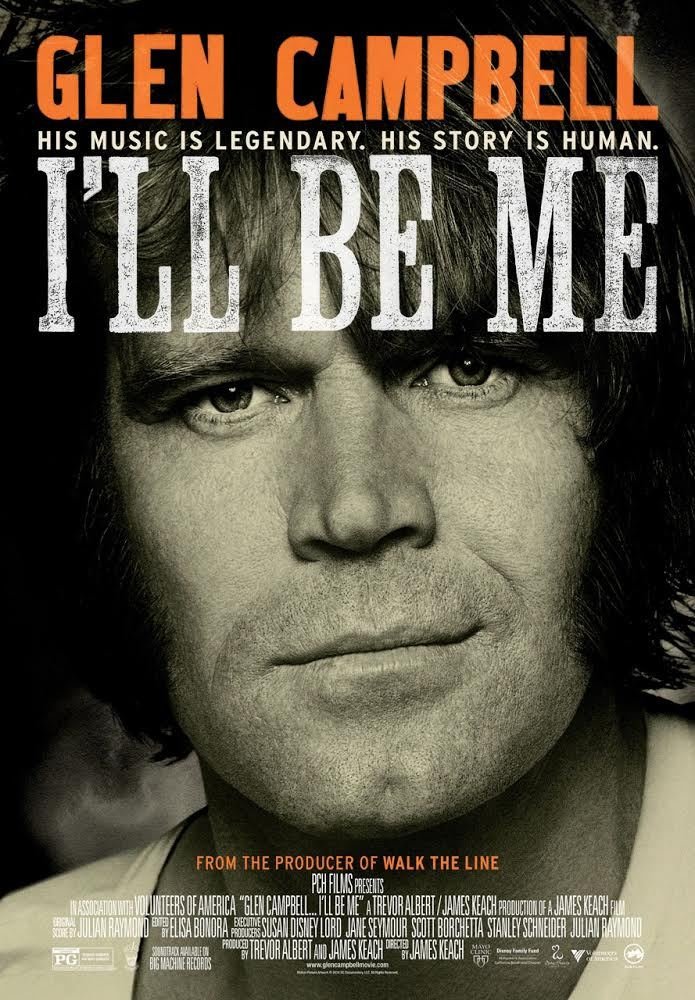The extraordinary documentary about the Rhinestone Cowboy’s final concert tour is available on streaming platforms.
Many celebrities — maybe most celebrities — would reflexively draw away from the public eye, to avoid public scrutiny and personal embarrassment, after being diagnosed with Alzheimer’s disease. Not Glen Campbell.
In June 2011, two months after his 75th birthday, Campbell — who was born April 22, 1936 in Billstown, Arkansas — revealed to the world that he had the terrible and terrifying disease that gradually, relentlessly, decimates the memory. At the same time, however, the enduringly popular country-pop star announced plans for a series of farewell concerts. Later that fall, Campbell began what was originally scheduled to be a five-week tour —a tour that eventually extended to 151 shows over 15 months.
Kim Campbell, the singer’s wife, accompanied her husband on the tour, and three of his children — Ashley, Shannon and Cal — performed in his backup band. Some performances went surprisingly smoothly. Others didn’t. “It was almost like a game of roulette,” Ashley Campbell told the New York Times in a 2014 interview. “You’d have a great show and then a difficult show, and you’d start to wonder, ‘Oh no, is this getting towards the end?’”
The same question occasionally occurred to director James Keach and producer Trevor Albert as they followed Campbell on and off stage during the filming of Glen Campbell: I’ll Be Me, an extraordinary behind-the-scenes documentary that is by turns heartbreaking and spirit-lifting as it charts the decline and defiance of an artist struggling to transcend his affliction while continuing to do what he does best and loves most. The film — which had its world premiere at the 2014 Nashville Film Festival, and features admiring commentaries by Paul McCarthy, Brad Paisley, Steve Martin, Blake Shelton, Bill Clinton and other notables — is now available on various streaming platforms.
Keach says Campbell impressed him as “a real-life hero” during the lengthy production of I’ll Be Me, which he views as not only a tribute to “one of the greatest musicians this country has ever known,” but also a group portrait of a family bravely united in a common cause. The film does not stint on showing Campbell traversing wild mood swings while raging against his incurable disease, or struggling to recall song lyrics, and recognize once-familiar friends and surroundings. Time and again, however, I’ll Be Me also emphasizes the ties that bind, the music that delights, and the spirit that endures. “The making of this film has been an exhilarating, joyous and inspiring ride,” says Albert. “I attribute that entirely to the heroic spirit of Glen Campbell and his extraordinary family.”
Following the Nashville Film Festival premiere of Glen Campbell: I’ll Be Me, I had the privilege of hosting a post-screening Q&A with Keach and Albert. Here are some excerpts from our conversation, edited for length and clarity.
One of the more gripping aspects of this film — and I mean this as a compliment — is that it almost makes you feel like you’re watching the work of people employed in a bomb-disposal unit. You’re amazed by the craftsmanship of the filmmakers — but you're also afraid everything will blow up in their faces at any moment. Was there ever a point while you were making the film when you were, quite literally, scared?
James Keach: I think right from the first. The thing is, we actually thought the film would go five weeks if we were lucky – if Glen was lucky, if the family was lucky — and [the tour] went 151 shows. The bomb, I couldn't halt. In dramatic movies like this, the bomb is put under the table. Here, it was called Alzheimer's. And at any time, it could go off. I think it's a tribute to the family, and the fans coming to watch him, and love him, and empower him — that kept Glen going. Nature took its toll eventually, but his spirit is just — well, just extraordinary. He kept us laughing the whole time. It was a pretty amazing experience.
Trevor Albert: I think the first time we watched Glen in rehearsal and we were contemplating whether we were going to do the movie or not — it was kind of chaotic and, like you saw, kind of scary. James and I went home that night, and I said, “I don't know if this can work. You're on a tightrope with this thing.” If he was going to have trouble in a rehearsal studio, we thought, “How's he going to do it in the Nokia Auditorium with 2,500 people?” So from the beginning, from the first time we saw him rehearse, we thought, “Is this going to be the last time we're going to see him?” I think almost every show we went to — maybe you experienced it watching it — every time there was a mistake or it felt like something was unsettled, very quickly James and I felt that in our stomachs: “Oh my God, is it going to happen now?” This was a recurring thing every single performance.
James Keach: I think it helped a lot that the children — Ashley and Cal and Shannon — were so present for him, and so loving towards him that he felt safe. Listen: He's more familiar on that stage than he is anywhere else. It’s like Kim said: “That's what he knows. He knows music.”
What may surprise people when they see I’ll Be Me is how funny it often is. Even when he’s at what looks like his worst, Glen seems to still have a sense of humor.
Trevor Albert: I think comedy is what keeps people alive sometimes, makes them survive those really difficult situations. While watching the movie tonight and hearing the audience laugh — I think for James and I, it was a very rewarding experience. Because that's what we experienced when things got dark. There was always a laugh from one of the kids, or Kim was very funny, or Glen. We really hoped that that was going to keep the movie alive, and make it watchable.
I have to confess: I had an opportunity to see Glen Campbell in Houston during this concert tour — and I wimped out. I was afraid I would be heartbroken or embarrassed — or, like we talked about, maybe the bomb would go off. But here’s the thing: Every single friend of mine who did see that Houston concert told me, “You missed a great show.” So I guess there really were nights when everything was cooking…?
James Keach: Oh, yes. Definitely.
Trevor Albert: And the audience response was unbelievable.
James Keach: Actually, Ashley said that the show just two shows before the last one was one of the better shows.
How did Glen interact with you on a day-to-day basis during filming?
James Keach: Actually, he liked the camera. He always liked it when we were filming him.
Trevor Albert: I think there were times when he was not physically in a great mood, and we’d come in with our cameras, and he just lit up. He turned it on. Although there was one time at the Town Hall in New York — it was a little bit of a nervous day, because Glen was a little bit disoriented before the show. James was filming on one side of the stage, and Glen was singing. And all of a sudden, he sees James. There's 4,000 people in the audience, and he's just walking over to James, and James is waiting for him to pull him into the song.
James Keach: He put the mic in front of me to sing the song. I said, “Look, Glen…” [Laughs]. But he knew what he was doing. He has a wicked sense of humor, and he's just great.
Was he always aware who you were and what you were doing?
Trevor Albert: Many days over the course of a year and a half, we would come and see Glen — and even though we'd seen him the day before, it was a little bit like reintroducing ourselves. He sort of knew the essence of who we were, but it wasn’t like, “Hi, Trevor. Hi, James. How are you?” It was a very interesting sort of dynamic that I think people who deal with this disease are familiar with. But we'd never experienced it before.

What did you know about Glen Campbell before you started making I’ll Be Me? And what did you learn while you were making it?
James Keach: [Laughs] I knew he was a singer. I know he had been a bad boy, but he seemed like he was a choirboy. I knew that he was married to really attractive women. And I knew he was, or had been, a big star.
Trevor Howard: We knew that he was a great interpreter of music. And I remembered his songs, like “Rhinestone Cowboy,” “Galveston,” and “Wichita Lineman.” But I didn’t know that he was considered one of the best guitar players in the world, and we learned this on the journey. And I also didn’t know that he was one of the most naturally funny people I've ever met. And I've worked on comedy most of my career. You know, when James and I started this, and we had those conversations about how Glen Campbell has Alzheimer’s, and we’re going to follow him, and make a movie about him — we thought, “This could be a really depressing year or six months.” But we wound up having the most joyous two or three years of our lives. And probably the proudest experience we’ve had making a movie in our lives. So it totally defied our expectations.
James Keach: You know, Glen taught us to live in the moment. That’s it: All you have is now. Glen always talked about being honest and telling the truth. We called him the Buddha. He is a Buddha. And he would warn us all the time: “That’s just BS. Lying. That’s just BS. That’s no good.” But he also said, “I've got a clear conscience, and I feel great.” He taught us to appreciate every day. He said: “I've laughed and I've cried, and it’s a hell of a lot better to laugh.” That’s probably the best thing we could leave us with.













